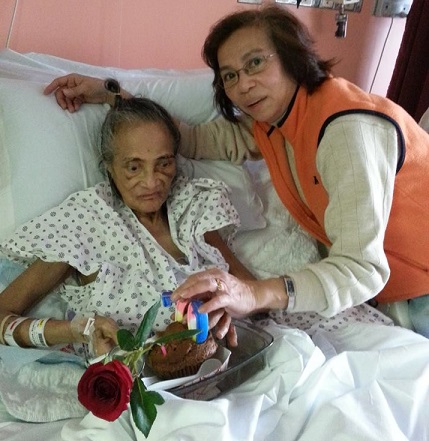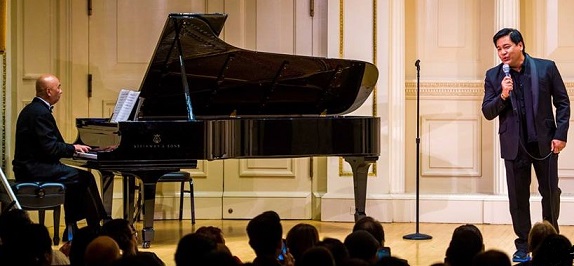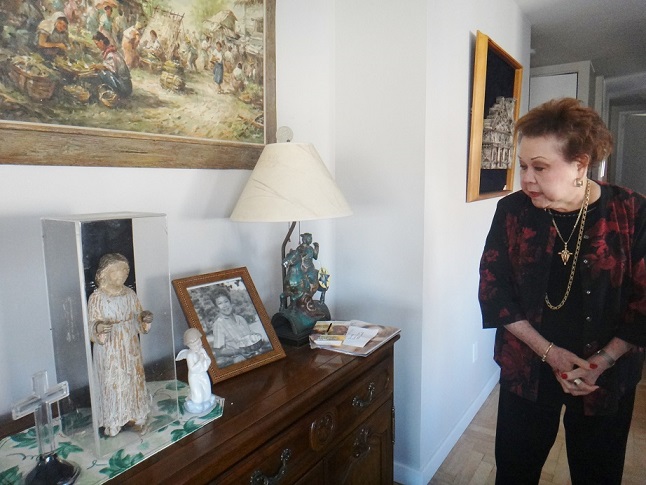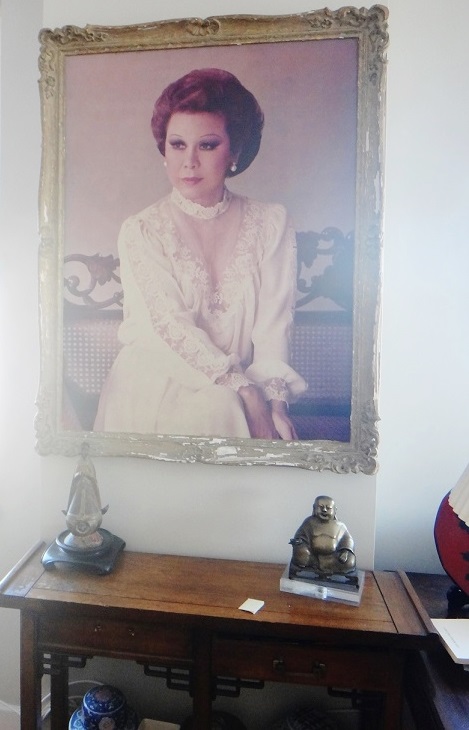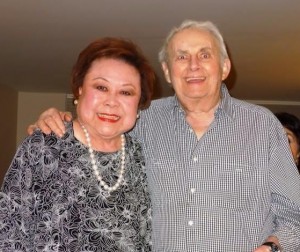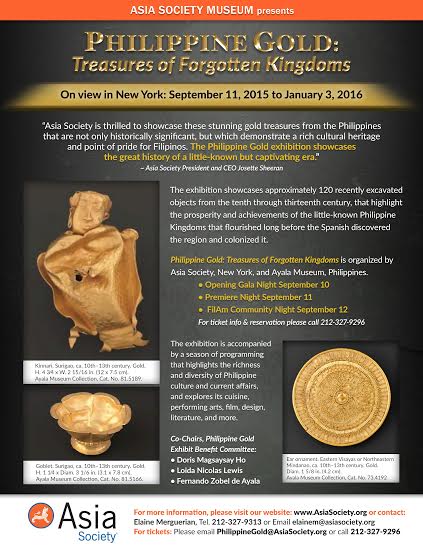Leila Benitez McCollum re-emerges, wins Empowerment Award
By Cristina DC PastorShe is not a recluse, and neither is she driven to staying private and mysterious. She attends mass at the Church of the Blessed Sacrament on West 71st, hosts family dinners in her Manhattan apartment, and played golf every once in a while.
Last year, she made sure to attend a couple of Simbang Gabi masses because she misses the warmth and festivity of the Filipino holidays as she remembers them: with friends gathered at mass amid the joyous singing of Christmas carols.
On August 14, Leila Benitez McCollum, the Queen of Noontime TV, received an Empowerment Award for Radio and Television from Fiesta in America. As one of the hosts of “Student Canteen” talent show in the 1960s, she was a beloved television personality for more than two decades, a role model for Filipinas looking to women who have set their own standards for class and professional accomplishment.
At Fiesta’s People’s Ball, Filipinos from an earlier generation who remember “Student Canteen” as wholesome entertainment, flocked by her table for photos and brief, adoring pleasantries.
“I grew up watching your show,” a group of nurses said as they hovered around the elegant woman in black. Leila smiled and acknowledged a handshake or a hug.
“She likes to be around people,” said her niece Vivian Talambiras Cruz, who went with her to the People’s Ball where the awards were handed out.
For the most part, however, Leila, who is in her 80s, keeps tabs on doctor’s appointments. A physical therapist comes to her house regularly. Her husband, Don, has always been by her side driving her to her appointments, welcoming visitors, and keeping her updated on news in social media.
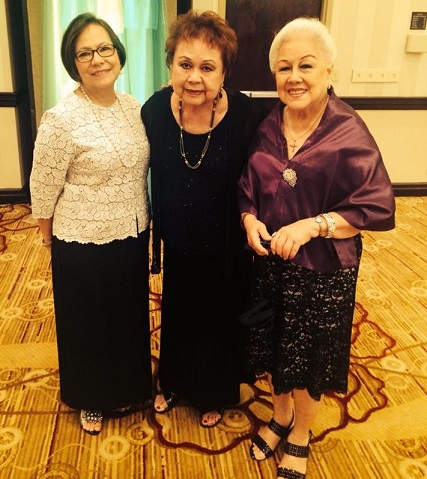
With niece Vivian Talambiras Cruz (left) and UNIFFIED’s Lumen Castaneda at the People’s Ball. Photos courtesy of Vivian Talambiras Cruz
“I don’t have Facebook, but Don has,” Leila told us when we recently visited her apartment, decorated in Old World art, French chinoiserie furniture, and where a large dining table held piles of letters and utility bills
No smartphone for her either. She keeps a flip-up in her pursue for when any of her three sons – Gerry, Martin and Gil – and four grandchildren need to get hold of her.
Leila, for the Millennials who glimpse her from their parents’ stories, was the Philippine Oprah. She was very popular from the late 1950s when she started hosting “Student Canteen” for ABS-CBN, the classic convent-bred ‘colegiala’ with the looks, the social correctness, and the fastidious way she spoke English: straight, pure, not Taglish.
After high school, her parents sent her to the U.S. for college. She came back with a degree in Psychology from
Georgetown University in Washington D.C., the same school where her father, Eulogio Benitez, a former congressman, was educated.Television was not in the cards, but when she returned to Manila, she was determined to find a job and “cut off the apron strings,” said Leila when I interviewed her back in 2004.
“I had lunch with this PR lady, Carol Guerrero. She told me it’s a shame to waste your voice, can you come visit me at the Chronicle Broadcasting? We needed somebody fresh and new, and would I be interested to voice on radio?” That was Leila’s recollection of their conversation.
The radio executives were smitten with her looks, her finishing-school manners and American diction, they immediately put her behind a booth. Soon, she was speaking on “Student Canteen” radio like an old hand.
“That was the era of drugs among kids,” recalled Leila. “But with ‘Student Canteen,’ kids came to the studio during lunch hour with guitars and instruments and showing of their talent instead of experimenting with drugs.”
“Student Canteen” radio was a big hit, and so the show made a decisive crossover to television to reach a wider audience. The fans got a good look at the statuesque beauty and her male co-hosts Eddie Ilarde, Pepe Pimentel, and Bobby Ledesma. All four had this great comedic chemistry, the men playing for laughs to Leila’s straight face. The best was when they intentionally fractured the English language and Leila would set them straight because she spoke English with an American accent and she could hold her own against her male co-hosts.
“Student Canteen” dominated noontime ratings for about 15 years until Ferdinand Marcos imposed Martial Law in 1972.
Leila was abroad when the Philippines was thrust into political chaos because of Martial Law. The media was shrouded in uncertainty. Newspapers were shut down and television networks, including ABS-CBN, were confiscated by the government. On the advice of family and friends, she decided not to come home.
In the U.S., she worked with Voice of America to resume her career, albeit a different kind of broadcasting. One of her friends introduced her to Don McCollum, who would later become her third husband. Don, an American of Scottish-Irish descent, worked in media marketing and research and traveled a great deal to Asia. The friend thought the two would hit it off well, being that both were media professionals. They did and got married. They recently celebrated their 38 years together.
“Student Canteen” was the “Johnny Carson Show” of the Philippines, mused Leila.
“It was so popular we would get a call from the U.S. Embassy in Manila, like, we are expecting Harry Belafonte to visit the Far East, can you please feature him on your show?” Neil Sedaka and Ann-Margret were among the American celebrities who had appeared on the show.
She returned to Philippine television years later via “Celebrity Hour,” an interview program with leading personalities directed by Lupita (then Concio) Kashiwahara, the sister of Ninoy Aquino. It did not have the enduring steadfastness of “Student Canteen,” but she was proud of its value to entertain and educate.
“I’ve always wanted to show (programs) that elevate and not bring down the level of standards,” she said decrying how some contemporary shows offer mostly entertainment and nothing much. In the end, she asked, “What are they trying to say to their viewers?”
Taglish, she noted with dismay, is widely spoken on Philippine television and has contributed to the desecration of both the English and Tagalog languages.
“The hosts, if they wanted to say something, should speak either straight English or straight Tagalog,” said Leila, “but they should not change five times in one sentence.”




